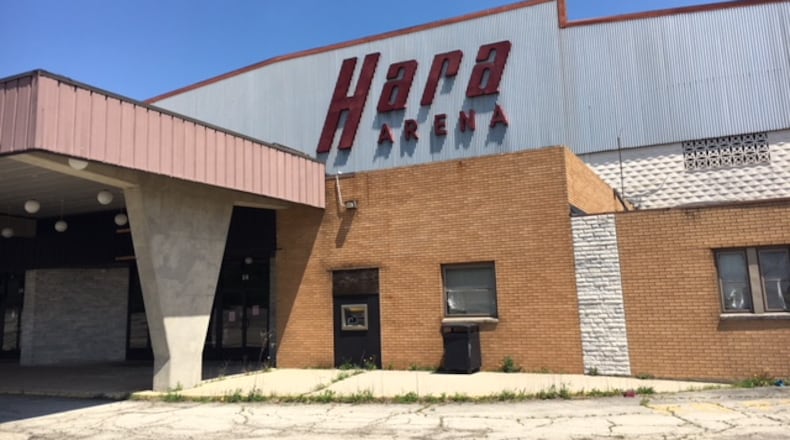Heitz now has access to the site, and expects to own it outright in three to six months.
“We see quite an opportunity here,” Heitz said in an interview at Hara. “We’re talking about 120-plus acres, a building that’s 650,000-square-feet, a shovel-ready area right here.
MORE: Twin Troy facilities are at the heart of Honda's parts network.
“It’s hard to find this big of a block where you have all the utilities, the highways,” he added.
Already, the developer said he is getting inquires about the former concert hall and the associated complex of buildings off Shiloh Springs and Wolf roads.
The next steps: Heitz will analyze and secure the property. There will be an environmental study, he expects.
“We’re working very closely with JobsOhio,” Heitz said. “It’s been amazing. Since it kind of broke last week, we’ve kind of had several inquiries about it already.”
MORE: Nestle and Starbucks: A match made in caffeine and chocolate
Asked who has contacted him about Hara, he said: “Major companies. You just don’t find a location with 125 acres in one location here, where you have all the utilities available.”
Chuck Ackerman, brokerage senior vice president with Colliers International Cincinnati-area industrial services, said it’s unusual to have this much available land in one spot.
“Those listings are very rare,” he said.
Right now, industrial sites are the hot property type all across the country, Ackerman said.
RELATED: HARA UPDATE: 'Large users' are already eyeing Hara
And a number of non-traditional uses for those kinds of properties have surfaced in recent years — self-storage, breweries, any kind of sports or fitness facility, rock-climbing facilities, trampoline parks and more, he said.
Do you have memories of Hara Arena? Check this out: Hara may have a new owner and developer behind it. https://t.co/CBUamr7FDI
— Thomas Gnau (@ThomasGnau) May 2, 2018
“All these different uses really create a huge void in available industrial properties,” Ackerman said. “So, it seems like an industrial use, at least in some capacity, would be permitted here.”
There could a number of successful uses at Hara, which closed in August 2016. “Hopefully, a lot of jobs. Hopefully, some new buildings,” he said. “I think the sky is the limit, with all of these different users coming out.”
DOWNTOWN NEWS: Home of Table 33 to be renovated
Ackerman said Colliers will eventually list the property for Heitz.
Proximity to Interstate 75 and U.S. 35, condition and available zoning are all strengths that could work for this property, Heitz believes.
One possibility will be to demolish the buildings on site and “Build something new here,” Heitz said.
“Until we get in and analyze everything, we don’t know yet,” he said.
The story behind Hara is a long one. The Wampler family had owned and operated the land since the 1950s, with what was first a dance hall and later an exhibit hall in an area that had been a family fruit orchard.
When the complex shut down in 2016, the estimated economic hit to Trotwood and the area was said to be $36 million a year.
Walk inside any of the buildings today, and their condition does not appear good. There is evidence that trespassers have been inside the buildings and have ransacked the interiors to some extent. Step into the former East Exhibit Hall, and visitors can find a red Ford F-150 pickup truck on four flat tires parked inside.
The arena has been home to basketball, ice hockey, indoor football and other sports teams and countless rock concerts. Ackerman recalled going to a Van Halen concert at Hara in 1983. The amateur radio convention known as Dayton Hamvention called Hara home since the 1960s.
Heitz, too, has a history in Dayton. His acquisitions and work include the old Howard Paper building on Edwin C. Moses Boulevard , the Love Boutique, the Royal Motel, the Harris Thomas Drop Forge Co. and others.
“Dayton is like Houston was during the early 1980s,” Heitz told this newspaper in 2014. “Dayton is coming back. There is a lot of business coming in. I pattern this after Houston.”
About the Author

